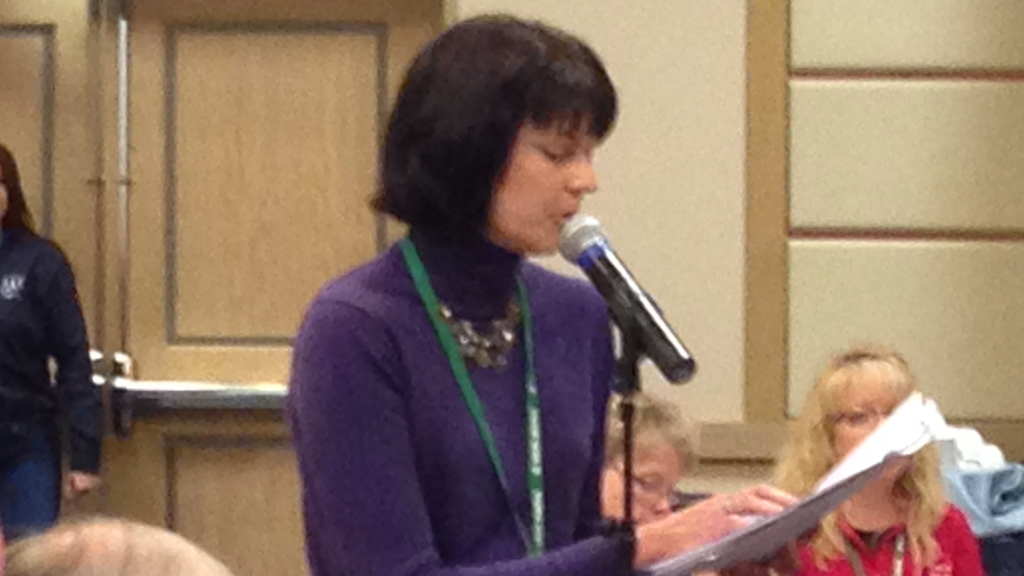Idaho’s school board members overwhelmingly endorsed Idaho Core Standards during their annual convention on Friday in Coeur d’Alene.
Board members voted 2,910 in favor and 492 against a resolution that calls for the Idaho School Boards Association to support the standards, which have already been implemented in all Idaho schools.

Voting was weighted by district size and three of Idaho’s largest districts supported the resolution — Meridian, Boise and Pocatello. Only board members attending Friday’s business session were allowed to vote.
Boise School District trustee Nancy Gregory presented the resolution.
“Supporting these standards is a good thing for our students,” she said. “We need to voice our support for this higher level of student achievement possibility.”
Also voicing support of the resolution were Moscow trustees.
Speaking against the resolution were trustees from the West Jefferson, Boundary County and Madison districts.
“I’ve never see such anxiety and uncertainty among teachers in my life,” said Brian Pyper of the Madison School District and a professional educator. “I see a lot of fear.”

The debate over the resolution lasted 20 minutes, the maximum allotted time.
Two resolutions did not pass — including a Garden Valley School District proposal asking the state to support training school personnel to possess and use guns on campuses. Idaho law already allows designated school personnel to possess guns.
Garden Valley trustee Rosemary Koenig said her school is remote and law enforcement officers could not reach the campus quickly enough in an emergency. She said schools shouldn’t spend money on law enforcement, calling it a state responsibility.
The resolution failed on a 2,981 to 521 vote. The ISBA’s executive board had opposed Garden Valley’s resolution because the Idaho Sheriffs Association opposed it. The sheriffs’ group said it doesn’t have training specifically designed for school personnel, and said districts should work with their local sheriffs to develop safety plans.
The only other resolution that failed was the Jerome School District’s idea to “allow school districts and charter schools to opt into a state-provided software application” to save districts money. That resolution was defeated by a large majority of 3,002 to 420.
In addition to the Common Core resolution, six other resolutions passed and will become part of the ISBA’s legislative platform:
- Operational funding. The ISBA will push to restore schools’ so-called “discretionary funding” to pre-recession levels. Since 2009, operational budgets have been cut by $82.5 million; schools say the funding helps pay for benefits, utilities and transportation, among other items. Gov. Butch Otter’s education reform task force also supports restoring this funding.
- Mastery learning. This resolution recommends moving the basis of public schools’ funding formula away from “seat time,” and towards a formula based on enrollment. This shift would give districts “the flexibility to restructure and redesign education for the 21st century without seat time requirements.” The governor’s education task force recommends gauging student performance based on subject mastery — and a corresponding change in the funding formula.
- A “knowledge- and skill-based” salary index. This resolution will align with Idaho’s move to “mastery-based instruction,” and help Idaho hold on to quality teachers. Supporters say the idea has political value: “The Idaho Legislature will look more favorably on increasing teacher salaries if accountability and improvement measures are part of a new index.”
- Certified salaries. Some school districts are putting money from voter-passed levies into salaries for administrators and other certified staff. This creates an imbalance among districts, which will persist unless the state puts more money into certified staff salaries.
- Voluntary School Board training. The ISBA already provides training for the state’s unpaid school trustees — and this resolution says districts have the choice to decide whether their trustees need schooling. The ISBA will not recommend that training be mandatory.
- Local governance. This resolution says a new federal education law — a reauthorization of the Elementary and Secondary Education Act — must also protect local school boards’ autonomy.
In other action, school board members elected Lisa Burtenshaw of the Idaho Falls School District to be their new president-elect. Her term begins next year. John Menter of the Troy School District was named vice president-elect. Neither had opponents.
